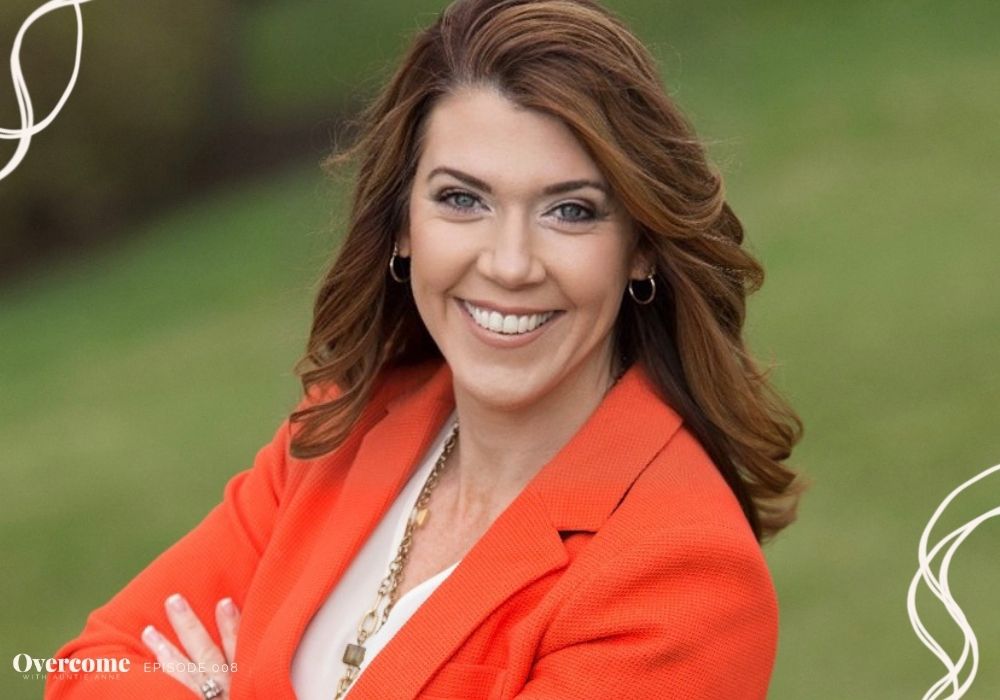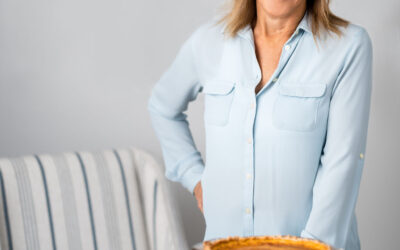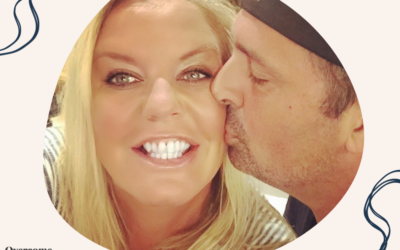It’s natural when struggles in life come to ask, “Why me?” But what if we learned to turn that around and asked instead, “Why not me?” Could we start to reframe the struggle, as difficult as it is, in a way that allows us to help others?
Casey Baynes is a “Why not me?” type of person. The struggles she’s faced throughout her life have been taken head-on, and she’s used them to help thousands of people. With infectious positivity and optimism, Casey’s philanthropic endeavors enhance the emotional well-being of families with critically ill kids. And you can’t help but want to be a force for good and positivity when you’re around her.
This week on Overcome With Auntie Anne, I talk with Casey about the struggles she has overcome and the work she’s doing to make a difference. Listen to the podcast to hear the full interview or keep reading to catch some of the highlights.
Casey Cares
I first met Casey Baynes ten years ago when I had the opportunity to be on the show Secret Millionaire. The idea behind the show was that I’d be taken to a predetermined location, and while living there, I’d meet and interact with different organizations in the area doing incredible work. The catch was, though, I wasn’t allowed to tell them I was Auntie Anne Beiler, founder of Auntie Anne’s® Pretzels Inc. To them, I was just “Fern” (my middle name).
While in Baltimore, and incognito, I visited the Casey Cares Foundation and met Casey who is its founder. Casey started Casey Cares in 2000, and today, the organization works with families who have critically ill children. Whether it’s an athlete meet and greet, concert tickets, group parties, vacation getaways, or something as simple as a new pair of pajamas while undergoing rigorous medical treatment at area hospitals, hospices, or at home, Casey is truly dedicated to helping not just the sick children, but also their siblings and the parents who endure incredible hardships after a critical medical diagnosis is made.
When Casey and I first met in 2011, there were a little over 9,000 kids in the Casey Cares program. This past year, there were 32,000 kids! As Casey shares, 33% of non-profits had to stop operating because of Covid. But Casey Cares is still going strong and helping more families than ever.
Growing up with dyslexia
Before Casey Cares was ever an idea, Casey was a second grader with dyslexia staying in from recess because of a failed spelling test while her classmates went out to play. As Casey puts it, growing up in the ’70s and ’80s with dyslexia meant that people thought you were stupid, and the school she went to affirmed that idea, telling her she’d never amount to anything.
But in the household where she lived, the word “can’t” was never to be used. And when Casey took it upon herself to take a black marker and go through all the paper dictionaries in her classroom and cross out the word “can’t,” her parents didn’t punish her or condemn her. Instead, they told the school, “You’re welcome.” Growing up in this type of environment showed Casey that anything is possible. It’s up to us, though, to choose what we’re going to put our energy into and what we’re going to prioritize.
This struggle with dyslexia didn’t stop Casey. While some people consider it a handicap, she says she wore it “like a cape,” and it helped empower her as she grew up. It taught her to be strategic, to learn to prepare and to be organized. It also helped her to develop her interpersonal skills, and now she loves hearing different people’s stories, what excites them, and what gets them going.
This doesn’t mean it was always easy. Casey felt shame and embarrassment over her dyslexia and still feels that at times today. But she keeps going, doing the best she can. Not only did she graduate from college, but she also became the youngest person to receive a master’s degree from Towson State University at age twenty.
And she’s still using her “Why not me?” attitude to grow and learn. Having dyslexia makes it difficult for Casey to read, so she took it upon herself during her Covid downtime to become a better reader. She’s the perfect example of not allowing a struggle to be overcoming, but overcoming the struggle to be empowered.
Having a child with a critical illness
In 2001, Casey’s daughter Mackenzie was born, and at age ten she was diagnosed with rheumatoid arthritis. In fact, when they took her to the hospital after noticing some symptoms, the doctor said that she needed to start treatment immediately—that day—or she’d end up in a wheelchair.
Mackenzie, now 20, has been receiving chemo treatments for the past 13 years. As a child with a critical illness, Mackenzie could have been in the Casey Cares program. And as Casey says, having her own child with a critical illness has allowed her to create an even stronger connection with the families she helps because she’s lived it and understands the struggles it entails. While we can’t change our story, we can change our future, and Casey’s story has impacted her future.
Struggles versus obstacles
Casey tends to view obstacles and struggles differently. For her, an obstacle is an event, like when a business she was involved with burned down, creating the biggest fire Baltimore City has ever had. Although it lasted six days, in the grand scheme of things, it was just an event in the path of life. Struggles, she says, are more long-term—having dyslexia, having a child with a critical illness—these are struggles that continue on.
For Casey, the biggest struggle she’s faced in life is “where do you put the fear…where do you put the fear of failure? Where do you put the fear of not being enough? Where do you put the fear of, ‘did I cause it?’” Sometimes fear can be crippling. But Casey says that as she gets older, she’s doing a better job of embracing and talking about her fears. She’s sharing her story! Because by sharing our fears with one another, we can help each other overcome them.
Using struggles for good
By taking these struggles head-on, Casey started Casey Cares at age twenty while still working for her family’s business. She wanted to help people and started by volunteering in a hospital. And through that, she saw a need for critically ill kids and their families—they just want someone to walk with them through their struggles, someone to acknowledge that what they’re going through is hard, someone to support them. So she started by helping three families in 2000. And as I said above, last year, she helped over 32,000!
Knowing that a struggle is long-term and not just an event, Casey is committed to helping families throughout the duration of a child’s illness—not only the sick child but the moms and dads, brothers and sisters too. And even in the unfortunate event that a family’s child dies, Casey continues to help and be there for the family after the death. She understands that even though the child is gone, the family still needs someone to walk with them.
Throughout her life, Casey has taken the “Why me?” question and turned it into a “Why not me?” attitude. The struggles she’s faced have been used to help her become who she is today. And by overcoming, she’s not only helped herself but thousands of other people around the world. Thank you Casey for spending some time with me and for sharing your story. I loved being with you and am so grateful that we met all those years ago.
If you would like to learn more about Casey and the work she’s doing, go to caseycares.org or follow her @caseycares on social media. It’s there you can also refer someone to be in the Casey Cares program or learn more about volunteering with the organization. As Casey says, “Any little bit will go a very long way.”






